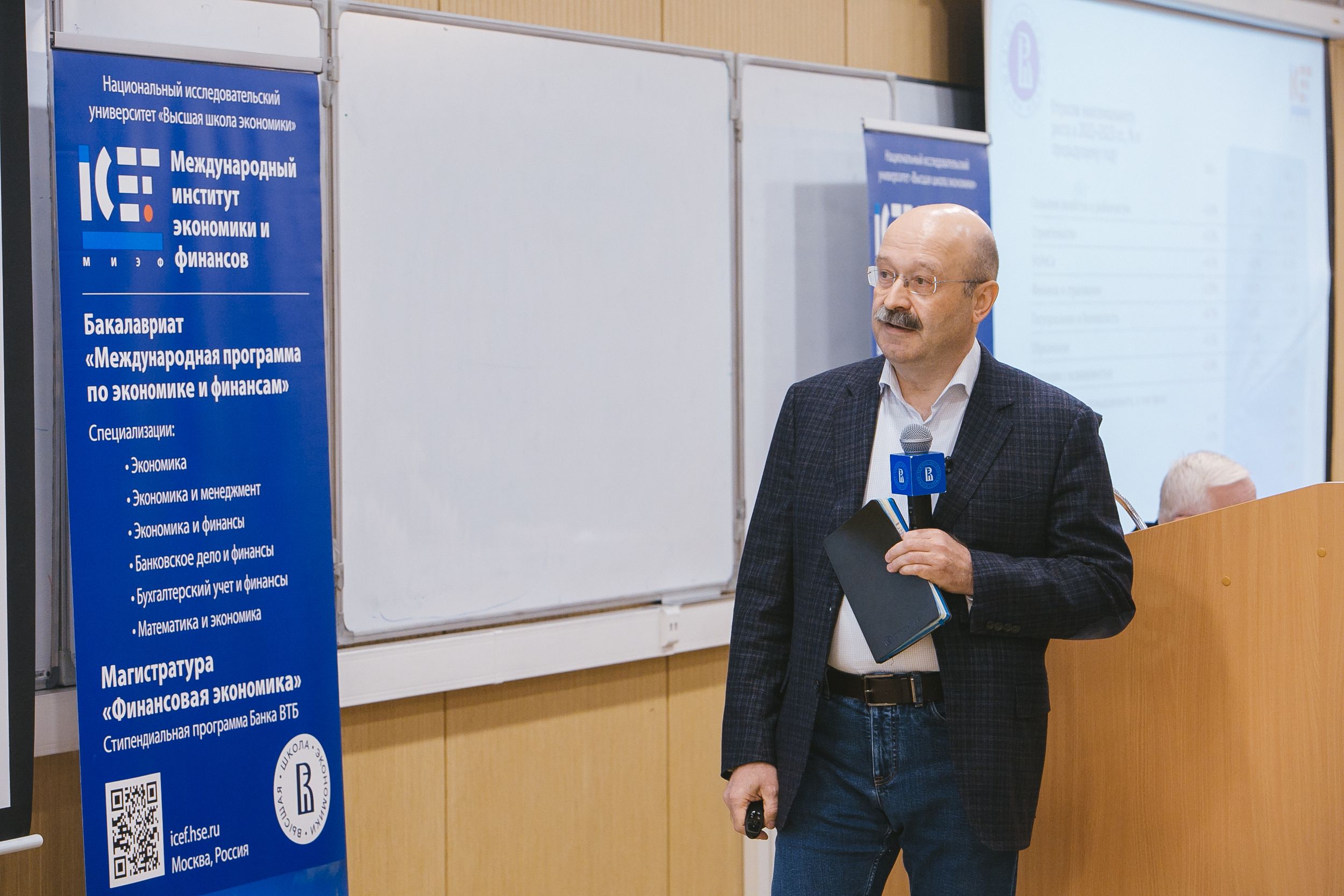Mikhail Zadornov on the Russian Economy: ‘It is a Completely Different Picture’
.jpeg)
The Russian economy has suffered due to sanctions, but has also adapted and begun to grow, compensating for last year’s losses. Mikhail Zadornov, Russia’s former Minister of Finance and member of HSE University’s Supervisory Council, spoke to students of HSE University’s International College of Economics and Finance (ICEF) about the economic situation in the country and the development of the financial sector in the new environment. The event was moderated by HSE University President and Head of the Russian Union of Industrialists and Entrepreneurs (RSPP) Alexander Shokhin. The lecture was the continuation of a series of meetings among well-known Russian practical economists and entrepreneurs and ICEF students.
Mikhail Zadornov noted that the economy showed a decline of 2.1% last year, but according to the results from January–July 2023, the country’s GDP grew by 2.1%. ‘The draft budget law (for 2024–2026) includes an optimistic forecast, which not everyone agrees with; according to the forecast, there will be 2.3% growth in 2024–2025,’ he said.

Growth and Decline of Industries
Last year, the hardest-hit sectors were the retail trade, household spending on domestic helpers, healthcare, and manufacturing. Car production also decreased by 45%.
The drivers of economic growth this year have been agriculture, construction, the hospitality industry, and the defence industry. Growth has been observed in such industries as insurance, government, and security, as well as education and electronics (which grew by 30% due to defence production). Growth in the automotive industry has resumed.
Oil and Gas Supplies
The government does not expect an embargo on Russian oil supplies to be introduced in the next three years, the former minister said. According to forecasts, its production volume will remain at the current level until 2026. Average prices for Brent oil will gradually decline to 80 USD per barrel.
Revenues from gas sales to Europe are now only a third of pre-February 2022 figures. The volume of supplies to Europe fell from 170 cubic metres to 87 last year, and to 46 billion this year. The construction of a large gas pipeline to China will not be enough to offset this decline, although it will allow for an increase in supplies to the country from 15 to 48 billion cubic meters by 2026. According to forecasts, the volumes of gas supplies to Europe and China will be equal in three years.
It is also expected that the dollar exchange rate will be 92 roubles in 2026.
The government forecasts that inflation will return to normal levels (4%) in 2025–2026.
Federal Budget
According to the Russian government’s forecasts, next year, federal budget revenues will increase by 6 trillion roubles and reach 19.5% of GDP (18.1% in 2022). The budget will be replenished from the growth of both oil and gas and non-oil and gas revenues, as well as from one-time revenues from the introduction of a single tax account and an increase in the recycling fee for cars.
‘If oil prices match the forecast values, this will reduce next year’s budget deficit to 1%, which by any standards is a very small amount,’ he emphasised.
Mikhail Zadornov analysed the main items of federal budget expenditures in detail. About 80% of federal budget expenditures this year are made up of national defence (3.9% of GDP), social policy (3.9% of GDP), national economy (2.5% of GDP), and national security (1.9% of GDP), as well as education and healthcare (0.9% of GDP each).
Banking Sector
The banking sector of the economy has experienced difficulties due to sanctions pressure, Mikhail Zadornov also noted. Next year, a significant decline in the growth rate of mortgages and lending is expected. In 2021, the sector’s profit amounted to 2.3 trillion roubles, while it was only 0.2 trillion in 2022. However, by the end of the current year, a profit of 3.4 trillion roubles is predicted. A quarter of this amount will be compensation for foreign currency revaluation: instead of losses from the strengthening of the rouble last year, the weakening of the rouble this year produced noticeable profits.
‘In general, despite the very rigid restrictions that were imposed on the Russian banking system and forced it to focus mainly on serving domestic clients, this year’s growth rates and good margins allowed banks to provide quite good profits,’ said Mikhail Zadornov.
Foreign Trade
He also spoke about the significant changes that are taking place in foreign trade. In 2013, the European Union accounted for 55% of exports, while in 2023, the leaders are China (30%), India (13%), and Turkey (10%). Imports from these countries are also growing rapidly. At the beginning of last year, there was a huge surge in exports against the backdrop of a fall in imports, but the situation has already returned to normal. According to the economist’s forecasts, in the future, Europe will account for less than 10% of Russian exports.
‘Few countries have changed their trade flows as much in 10 years as Russia has in 2013–2023. It is a completely different picture,’ Mikhail Zadornov emphasised.
Following the lecture by the former Minister of Finance, ICEF students asked a number of questions. In particular, they were interested in the effectiveness of the oil embargo, the profitability of bank deposits, and the safety of savings, as well as the feasibility of preferential mortgages.

